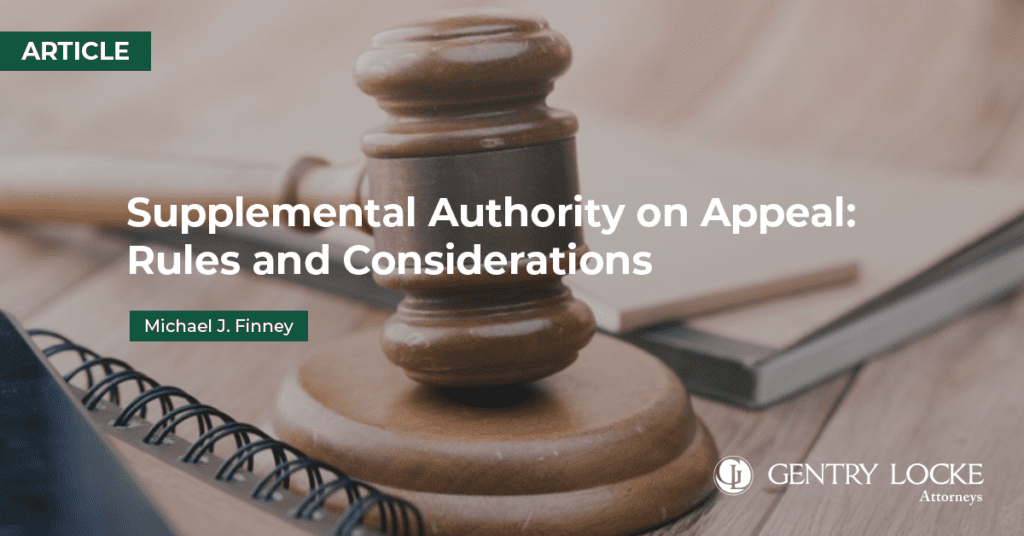Supplemental Authority on Appeal: Rules and Considerations

Despite a set schedule, appellate briefing is not necessarily closed prior to decision. Even after oral argument, a party may submit “supplemental authorities” by letter to the clerk. This letter is not limited to just citing the new authority—argument is ok too.
The rules for submitting supplemental authority are similar across the Court of Appeals of Virginia, the Supreme Court of Virginia, and the Fourth Circuit. The “authority” cited must be “pertinent and significant.” Temporally, it should “come to a party’s attention” (i) after the party’s petition/brief was filed or (ii) after oral argument, but before decision; the letter must then be filed “promptly. It needs to also explain why the authority is being submitted—including by reference “to the page of the brief or to a point argued orally.” And the body of the letter is limited to 350 words. See Va. Sup. Ct. Rule 5:6A; Va. Sup. Ct. Rule 5A:4A; FRAP 28(j).
The opposing party has the right to respond. This response is subject to the same substantive limitations, and must be submitted within 14 days (in the Court of Appeals of Virginia) or “promptly” (in the Supreme Court of Virginia or the Fourth Circuit).
While these are the basic rules, what factors bear on whether a party should submit a supplemental authority letter? Sometimes the decision is easy—i.e., if there is a new controlling case. Often, however, it will be a judgment call. To assist in exercising that judgment, here are a few considerations:
1. Does the material qualify as supplemental authority?
Under the rules, three words (each subject to interpretation) control this threshold inquiry: “authority,” “pertinent,” and “significant.” In general, “authority” should be limited to legal authorities, not material that would supplement the evidentiary appellate record. See 21 Moore’s Federal Practice – Civil § 328.60 (with limited exception, “authorities” are things like “statutes, cases, [and] regulations”).
“Pertinent” relates to the requirement to reference where the issue was previously discussed. In other words, a supplemental authority letter is not a vehicle to introduce additional arguments. See United States v. Ashford, 718 F. 3d 377, 381 (4th Cir. 2013) (finding that litigants may not use such a letter “as a means to advance new arguments couched as supplemental authorities”); Va. Sup. Ct. Rule 5:6A (the Supreme Court of Virginia “may refuse to consider the supplemental authorities if they unfairly expand the scope of the arguments on brief”); Va. Sup. Ct. Rule 5A:4A (same for the Court of Appeals of Virginia).
As for “significant,” one rule-of-thumb is whether a party would have cited the authority in the relevant filing, had it been aware of the authority at the time.
2. What about timing?
By rule, the supplemental authority should only have “come to a party’s attention” after the party’s last substantive filing or oral argument. While this is not strictly pegged to when the authority was available, litigants are expected to be aware of pre-existing relevant authorities. The letter accordingly should explain any disconnect or delay. See Va. Sup. Ct. Rule 5:6A (supplemental authorities may be rejected if they “raise matters that should have been previously briefed [or], appear to be untimely”); Va. Sup. Ct. Rule 5A:4A (same).
Letters must also be filed “promptly.” Key here is to avoid the appearance of gamesmanship and to give adequate time for consideration—both by the court and your opponent. Of course, if a decision is pending and the material is helpful, the supplemental authority should be filed as soon as possible.
Although the rules appear to allow reference at oral argument without first submitting a supplemental authority letter, that would not be good practice (and the supplemental authority may be rejected on the spot). Rather, a letter should be submitted in advance of a hearing.
3. Can you include argument?
“Argument” used to be expressly forbidden. In 2002, however, Rule 28(j) of the Federal Rules of Appellate Procedure was amended to remove this prohibition, and now “permits parties to decide for themselves what they wish to say about supplemental authorities.” FRAP 28, Committee Notes on Rules—2002 Amendment. The Virginia Rules were adopted in 2015 and likewise contain no restriction on argument.
4. What will your opponent likely say?
A supplemental authority letter can be a great opportunity: litigants have 350 words to introduce new authority and argue its significance to the appeal. But any evaluation of whether to submit such letter must game-out what your opponent will likely say in response. Just like an opening letter, a response can both highlight aspects of the authority and present related argument.
There is only an opening letter and response—no reply is permitted. This sequencing is important in assessing whether a letter will be a net positive. Appellate Lawyers, in particular, may be loath to give their opponents a platform to have the “last word.”





